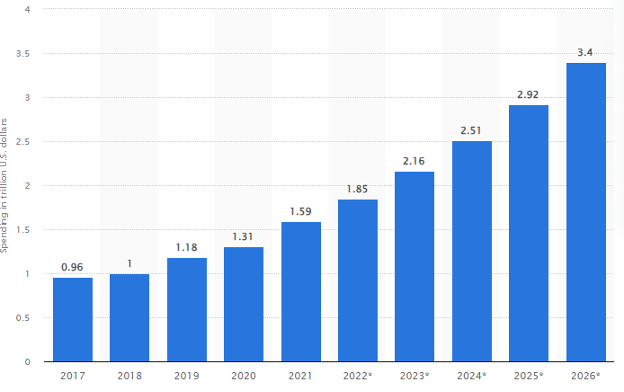Since 2021, the role of Chief Information Officers (CIOs) has been shifting rather dramatically. They are no longer just IT managers; they are now change agents, steering their organizations through turbulent waters of digital disruption. The demand for these change-enabling IT leaders is soaring as they reshape industries, driving innovation and adaptation.
By 2026, the total spending on digital transformation technologies is set to be valued at $3.4 billion – more than double the amount in 2021. The graph below shows how the upward trend is continuously increasing, registering a CAGR of 16.1% till 2027.

In this article, we’ll explore how CIOs have become change agents and their crucial role in ensuring their organizations stay competitive in swiftly evolving industries.
CIOs as Change Agents: Navigating Technological Disruption in Industries
In today’s dynamic business landscape, industries are being reshaped at an unprecedented pace, primarily driven by rapid technological advances. This transformative era requires visionary leaders to navigate through these changes successfully.
Among these leaders, Chief Information Officers (CIOs) are emerging as critical change agent. They are playing a critical role in implementing new technologies within industries and their corporate culture. In this article, we delve deeper into how CIOs are catalyzing digital transformation across various sectors, empowering industries to thrive in the face of technological disruption.
The Industry-Transforming Role of CIOs
In yesteryears, the primary responsibilities of CIOs centered on managing IT infrastructure and ensuring seamless operational functionality. However, as digital technologies have become the cornerstone of modern business, CIOs have assumed a more transformative role. They now stand at the forefront of technological innovation, leading industries into the digital age.
This transformation is best reflected in how CIOs are reshaping their focus:
- Expenses and Efficiencies (35%): CIOs are actively working to optimize costs and enhance operational efficiency within their organizations.
- IT Services Updates (34%): They are spearheading the modernization of IT structure and services to keep pace with the digital era.
- Business Development (28%): CIOs are key for driving business growth and fostering innovation.
This shift is not confined to mere statistics. PwC researchers emphasize that the CIO’s role has transcended the boundaries of traditional IT in the hybrid world. It has evolved into an all-encompassing position that spans all aspects of an organization.
This perspective finds further reinforcement from Deloitte’s research, revealing that 80% of business executives view the CIO as the central figure responsible for driving innovation. The essence of this transformation is that the CIO no longer just manages technology; they orchestrate the organization’s adaptation and success in the digital era.
A Glimpse Into The Industries
To truly appreciate the transformative role of CIOs, let’s explore how they are driving change in specific industries:
To truly understand the dynamic role of CIOs as change agents, let’s delve into specific industries and see how they are spearheading innovation:
1. Energy Sector: Pioneering Sustainable Energy Practices
CIOs in the energy sector are at the forefront of a green revolution. They harness cutting-edge technologies like the Internet of Things (IoT) and Artificial Intelligence (AI) to optimize energy production and distribution. Through IoT, they monitor and manage energy assets in real time, enabling predictive maintenance.
This means that critical infrastructure can be serviced before it fails, reducing operational costs and preventing costly downtime. AI is another game-changer for the energy industry. CIOs leverage AI algorithms to analyze vast datasets, helping them make informed decisions about energy distribution, load balancing, and demand forecasting.
The result is a more efficient, sustainable, and cost-effective energy ecosystem. Moreover, AI-driven predictive analytics play a critical role in renewable energy, ensuring a seamless transition to cleaner power sources. CIOs are driving sustainability and profitability hand in hand.
2. Financial Industry: Pioneers of Digital Finance
In the financial industry, CIOs are revolutionizing transactions and the customer experience. They embrace blockchain technology. This ensures that transactions are not only secure but also transparent.
Blockchain’s decentralized nature means that every transaction is recorded in an unchangeable ledger, providing unmatched security and trust in a world of digital finance. CIOs lead the charge in making financial transactions faster, more efficient, and tamper-proof.
Digital banking is another arena where CIOs play an important role. They champion mobile apps that empower customers to handle financial matters with ease and convenience. These apps enable users to access their accounts, transfer money, and manage investments on the go.
CIOs are creating an ecosystem where traditional banking boundaries no longer apply, and customer-centric solutions reign supreme. Bolstering cybersecurity is also a key mandate for CIOs in the financial sector.
With the rise of digital finance, protecting sensitive data is of paramount importance. Cyberattacks pose significant threats, and CIOs are leveraging advanced security technologies to fortify defenses, ensuring the safety and integrity of financial data.
3. Fashion Industry: Shaping the Future of Design
Within the fashion industry, CIOs are the architects of innovation. They’ve embraced 3D printing and virtual reality to reimagine the design and manufacturing process. These technologies are not only pushing the boundaries of creativity but also promoting sustainability.
3D printing, under the guidance of CIOs, has revolutionized the fashion production cycle. It allows designers to rapidly prototype and manufacture intricate designs with minimal waste. CIOs drive the adoption of 3D printing technology, making the fashion industry more sustainable and responsive to consumer demands.
Virtual reality is another tool that CIOs utilize to enhance consumer experiences. By creating immersive shopping experiences, customers can virtually try on clothing and accessories, making informed purchasing decisions. This technology not only caters to a tech-savvy audience but also reduces the need for physical retail spaces. The use of generative AI has also boosted the industry, empowered by CIOs.
CIOs in the fashion industry are pioneering a future where personalization, sustainability, and innovation are woven into the fabric of the business.
4. Fleet Management: Transforming Transportation
CIOs in fleet management are using telematics and GPS technologies to streamline operations and reduce environmental impact. They leverage telematics systems to track vehicle movements, optimize routes, and reduce fuel consumption. This results in not only cost savings but also a substantial reduction in carbon emissions.
The predictive power of data analytics is another avenue that CIOs explore. By analyzing data from vehicles and sensors, they can predict maintenance needs, allowing for scheduled repairs and minimizing downtime. Fleet management CIOs are at the forefront of implementing efficient, data-driven practices that save time and resources.
Forces Shaping Business Transformation
To fulfill this transformational role, CIOs must acknowledge the fundamental forces influencing the business landscape:
- Everything Is Digital: The proliferation of technologies like multi- and hybrid-cloud environments, containers, 5G, and blockchain has made digital transformation inevitable. The future is interconnected, API-driven, and highly complex. Managing both internal infrastructure and third-party services is essential for success.
- Hybrid Workforce: The post-pandemic work environment is characterized by virtual, mobile, and hybrid workforces. CIOs must ensure the seamless operation of this new work paradigm by harnessing collaborative technologies and robust cybersecurity measures.
- Talent Shortage: Attracting and retaining skilled talent is more challenging than ever. CIOs are mitigating this by implementing smarter systems and autonomous software to enhance workforce productivity.
- Big Data: Managing the exponential growth of data is a top priority for industries. CIOs are utilizing AI and machine learning to extract valuable insights from this data while also intensifying their focus on data security.
- Regulatory Compliance and Governance: Strict regulations like the California Consumer Privacy Act (CCPA) and the General Data Protection Regulation (GDPR) demand industry-wide compliance. CIOs are managing the complexities of regulatory adherence and addressing new security risks introduced by cybercriminals leveraging AI.
In embracing these forces, CIOs are the driving force behind business transformation, ensuring their organizations thrive in this ever-evolving digital age. They understand that adaptability is the key to resilience, and their strategic leadership ensures their organizations close the capability gap, fostering a culture of continuous improvement.
CIOs are the Vanguards of Industry Evolution
The transformation of CIOs from IT managers to transformative leaders is fundamentally altering industries. As spending on digital transformation surges into the trillions, CIOs are at the helm, driving innovation and adaptability in a fast-paced technological landscape. They are not merely responding to disruption; they are orchestrating the digital transformation that defines the future of business.
In a world where change is constant and technology is the driving force of innovation, CIOs are the vanguards of industry evolution, ensuring their sectors remain competitive, efficient, and agile. With CIOs as change agents, industries are embracing technology to not only survive but thrive in the face of technological disruption.


0 Comments